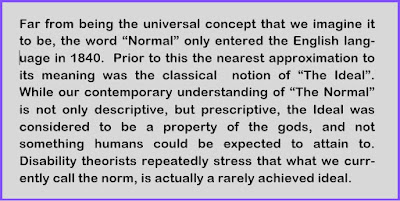Neurodivergent 1 describes the significant percentage of humans who are increasingly recognized as differing cognitively from Neurotypicality.
The adjective neurotypical itself emerged from the Autistic Self-Advocacy movement of the late 20th century. Pioneers of the movement used it to bypass the increasingly problematic term "Normal", while essentially pointing to the concept behind it. It's worth pointing out that the word "neurotypical" should not be read as a diagnostic term, i.e. one that has a specific set of signs and symptoms. It is purely a term developed to provide a necessary polar opposite of "neurodivergent".
Neither should the recently coined words based on the concept of Neurodiversity be read as scientific terms. They are socially constructed terms intended for advocacy purposes. This should clear up criticisms that these words are "pseudoscientific". When I first used the word "Neurodiversity", I did not intend it to be a diagnostic term. I saw it as a banner for a "Neurodiversity Movement" - a civil rights movement for those of us who had been stigmatized for being "weird, odd, or unfathomable" outsiders. While the word is not scientific, it does trade on the authority of neuroscience and biological science - which stresses the importance of conserving biodiversity - to argue for a revaluing of formerly stigmatized neuroMinorities
 |
From my thesis, a summary of ideas from
Lennard Davis, Enforcing Normalcy
|
The Ideal itself is undoubtedly based on evolutionary principles, but to some extent can be culturally defined; e.g some cultures value extroversion, others, introversion.
The boundaries of the normal range are fuzzy, and subject to contention. Small deviations from the normal range are often claimed as Identities. Large deviations are viewed as Disabilities. The boundary line between an identity and a disability is fuzzy, and will always be subject to disputation.
Why do we need NeuroDivergent? What's wrong with Neurodiverse?
So all humans are neurodiverse!
It's just that some of us have been excluded more than others for our divergence from the ideal.
Neurodiversity is a fact. The Neurodiversity Movement is however an identity politics vehicle for people who were discriminated against for differing from the culturally-defined normal range.
There are degrees of difference of course. Thus "neurodivergence" shades from difference to disability, with a grey area in between.
Our Western free-market liberal culture tends to favour extroversion, sociability, competitiveness, self-promotion, lots of noise and buzz. We also tend to worship youth and fear and shun old age.
Other cultures favour introversion, introspection, quietness, modesty, and tend to respect age. Think traditional Chinese, Jewish and Indigenous cultures.
The latter cultures are eye-contact avoidant in various circumstances, considering it variously disrespectful of status, invasive or manipulative. From the point of view of egalitarianism, this is a good thing.
But rather naively, Western culture demands eye-contact as a verification of sincerity, when in fact it can easily be used as a tool of emotional manipulation by psychopaths and con-artists!
Cultures change all the time of course. Not so long ago, absent-minded professors were honoured in our culture, though perhaps we laughed at their eccentricities behind their backs. Then along came Dr Lorna Wing and Uta Frith. Before long, we could easily find our professors' eccentricities dissected in the pages of the DSM IV Bible of Everything that could Possibly Be Wrong with the Human Mind.
The Neurodiversity Movement challenges the notion that we must all be generalists to survive. Neurodivergent people are often specialists with spiky ability profiles. The biological reality is that as a species, our success has been based on the evolutionary imperative of role differentiation.
Now read on for my reductionist, totally un-academic, Armchair Evolutionary Pschologist's take on "The Normal"
The latter cultures are eye-contact avoidant in various circumstances, considering it variously disrespectful of status, invasive or manipulative. From the point of view of egalitarianism, this is a good thing.
But rather naively, Western culture demands eye-contact as a verification of sincerity, when in fact it can easily be used as a tool of emotional manipulation by psychopaths and con-artists!
Cultures change all the time of course. Not so long ago, absent-minded professors were honoured in our culture, though perhaps we laughed at their eccentricities behind their backs. Then along came Dr Lorna Wing and Uta Frith. Before long, we could easily find our professors' eccentricities dissected in the pages of the DSM IV Bible of Everything that could Possibly Be Wrong with the Human Mind.
And yet, from an evolutionary view, we have an expectation of a range of normal behaviours, based on our primeval survival needs as Homo Sapiens emerging from the African savanna.
We evolved as a dominant hierarchical species, and our responses are still primed for survival in the wild, with high general levels of physical fitness, problem-solving and sociability.
We evolved as a dominant hierarchical species, and our responses are still primed for survival in the wild, with high general levels of physical fitness, problem-solving and sociability.
But do our advanced cultures still need the same "hard-wired" qualities for survival?
The Neurodiversity Movement challenges the notion that we must all be generalists to survive. Neurodivergent people are often specialists with spiky ability profiles. The biological reality is that as a species, our success has been based on the evolutionary imperative of role differentiation.
Now read on for my reductionist, totally un-academic, Armchair Evolutionary Pschologist's take on "The Normal"
Exit JS stage right, pursued by a Saber-Toothed Tiger
Click below to see how it turned out
Click below to see how it turned out
Acknowledgments
The coinage of the term "neurodivergent" is attributed to Kassiane Asasumasu













